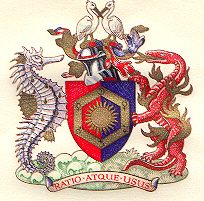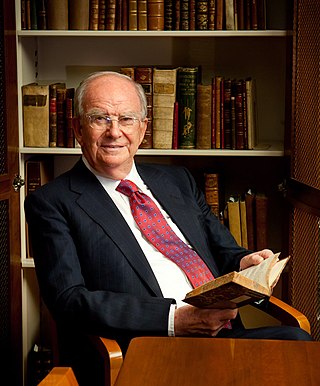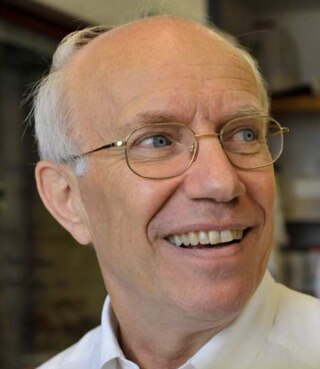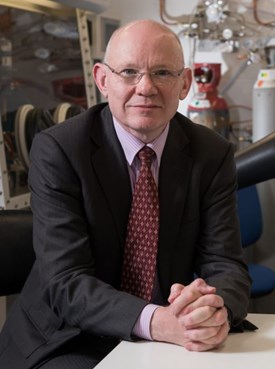
The Royal Society of Chemistry (RSC) is a learned society in the United Kingdom with the goal of "advancing the chemical sciences". It was formed in 1980 from the amalgamation of the Chemical Society, the Royal Institute of Chemistry, the Faraday Society, and the Society for Analytical Chemistry with a new Royal Charter and the dual role of learned society and professional body. At its inception, the Society had a combined membership of 34,000 in the UK and a further 8,000 abroad. The headquarters of the Society are at Burlington House, Piccadilly, London. It also has offices in Thomas Graham House in Cambridge where RSC Publishing is based. The Society has offices in the United States, on the campuses of The University of Pennsylvania and Drexel University, at the University City Science Center in Philadelphia, Pennsylvania, in both Beijing and Shanghai, China and in Bangalore, India.

The Royal Institute of Chemistry was a British scientific organisation. Founded in 1877 as the Institute of Chemistry of Great Britain and Ireland (ICGBI), its role was to focus on qualifications and the professional status of chemists, and its aim was to ensure that consulting and analytical chemists were properly trained and qualified.
The Royal Australian Chemical Institute (RACI) is both the qualifying body in Australia for professional chemists and a learned society promoting the science and practice of chemistry in all its branches. The RACI hosts conferences, seminars and workshops. It is the professional body for chemistry in Australia, with the ability to award the status of Chartered Chemist (CChem) to suitably qualified candidates.

Sir John Meurig Thomas, also known as JMT, was a Welsh scientist, educator, university administrator, and historian of science primarily known for his work on heterogeneous catalysis, solid-state chemistry, and surface and materials science.

Malcolm Leslie Hodder Green was Professor of Inorganic Chemistry at the University of Oxford. He made many contributions to organometallic chemistry.
Tobin Jay Marks is an inorganic chemistry Professor, the Vladimir N. Ipatieff Professor of Catalytic Chemistry, Professor of Material Science and Engineering, Professor of Chemical and Biological Engineering, and Professor of Applied Physics at Northwestern University in Evanston, Illinois. Among the themes of his research are synthetic organo-f-element and early-transition metal organometallic chemistry, polymer chemistry, materials chemistry, homogeneous and heterogeneous catalysis, molecule-based photonic materials, superconductivity, metal-organic chemical vapor deposition, and biological aspects of transition metal chemistry.

Pierre Braunstein is a French chemist. He was director of the Laboratoire de Chimie de Coordination of Strasbourg (France) and is a member of the French Academy of Science.
Robin Perutz FRS is a professor of Inorganic Chemistry at the University of York, where he was formerly head of department between 2000 and 2004.He is also the son of the Nobel Prize winner Max Perutz.
Sir Ronald Sydney Nyholm was an Australian chemist who was a leading figure in inorganic chemistry in the 1950s and 1960s.

Francis Patrick John Dwyer FAA was Professor of Chemistry, Australian National University, Canberra. He was one of the most distinguished scientists Australia has produced. At the time of his death in 1962 he was widely recognised as a leading authority in inorganic chemistry, and had laid the foundation in Australia for a new field of research bridging science and medicine—biological inorganic chemistry. His influence as a teacher and as a researcher was widespread.
Peter Philip Edwards FRSC FRS is a British Emeritus Professor of Inorganic Chemistry and former Head of Inorganic Chemistry at the University of Oxford and a Fellow of St Catherine's College, Oxford. Edwards is the recipient of the Corday-Morgan Medal (1985), the Tilden Lectureship (1993–94) and Liversidge Award (1999) of the Royal Society of Chemistry. He was elected a Fellow of the Royal Society in 1996 and was awarded the 2003 Hughes Medal of the Royal Society "for his distinguished work as a solid state chemist. He has made seminal contributions to fields including superconductivity and the behaviour of metal nanoparticles, and has greatly advanced our understanding of the phenomenology of the metal-insulator transition". In 2009 Edwards was elected to the German Academy of Sciences Leopoldina, and he was elected Einstein Professor for 2011 by the Chinese Academy of Sciences. In 2012 he was awarded the Bakerian Lecture by the Royal Society "in recognition of decisive contributions to the physics, chemistry and materials science of condensed matter, including work on the metal-insulator transition". In the spring of 2012 he was elected International Member of the American Philosophical Society; one of only four people from the UK in that year to be awarded this honour across all subjects and disciplines. Later in 2012 he was awarded the Worshipful Company of Armourers and Brasiers Materials Science Venture Prize for his work on new, low-cost, high-performance conducting oxide coatings for solar cells and optoelectronic materials. In the Autumn of 2013 he was elected Member of Academia Europaea, and he was elected as a Foreign Honorary Member of the American Academy of Arts and Sciences in 2014.

Sir Peter George Bruce, is a British chemist, and Wolfson Professor of Materials in the Department of Materials at the University of Oxford. In 2018, he was appointed as Physical Secretary and Vice President of the Royal Society. Bruce is a founder and Chief Scientist of the Faraday Institution.
Graham John Hutchings CBE FRS FIChemE FRSC FLSW is a British chemist, Professor for Research at Cardiff University.
The Beilby Medal and Prize is awarded annually to a scientist or engineer for work that has exceptional practical significance in chemical engineering, applied materials science, energy efficiency or a related field. The prize is jointly administered by the Institute of Materials, Minerals and Mining, the Royal Society of Chemistry and the Society of Chemical Industry, who make the award in rotation.
The Nyholm Prize for Education commemorates the life and work of Australian-born chemist Sir Ronald Nyholm, who – alongside his research in coordination chemistry – passionately campaigned for the improvement of science education. He acted as president of the Royal Society of Chemistry from 1968 to 1970.

Javier Pérez-Ramírez is a Professor of Catalysis and Chemical Engineering at ETH Zurich.
The Bourke Award of the Royal Society of Chemistry is an annual prize open to academics from outside the UK. Originally established by the Faraday Society and known as the Bourke Lectures, the award of £2000 enables experts in physical chemistry or chemical physics to present their work in the UK. The winner also receives a commemorative medal.

Laura Gagliardi is an Italian theoretical and computational chemist and Richard and Kathy Leventhal Professor of Chemistry and Molecular Engineering at the University of Chicago. She is known for her work on the development of electronic structure methods and their use for understanding complex chemical systems.













